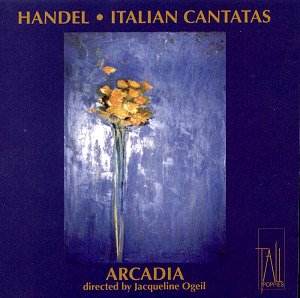The majority of Handelís
cantatas are essentially chamber works,
written for a solo singer accompanied
by harpsichord, a few solo strings and
possibly an obbligato instrument. With
Handel himself at the keyboard, they
were written to show off the talents
of singers at entertainments in the
houses of the nobility. During his early
Italian stay (1706 to 1710), he wrote
a remarkable number of these works for
use in the Palaces of his Italian patrons.
Often a cantata can be taken as a single
dramatic scene and we can see Handel
experimenting with techniques that he
would use in operas.
In performance, two
things are of paramount importance,
virtuosity and drama. This music was
written for some of the finest singers
of the age and when performed today
a singer should be able to encompass
all of Handelís technical demands and
then go on to use them for dramatic
and expressive purposes. In a cantata
which encompasses two or more arias,
the composer uses the dramatic form
to exhibit a variety of contrasting
emotions (affekts) and the singer
must be able to reflect this.
On this disc, the Australian
group Arcadia play five cantatas which
date from 1708 to 1711, all but one
written during Handelís Italian stay.
In the May of 1708 Handel travelled
to Naples and during his stay there
wrote the solo bass cantata Cuopre
tal volt ail cielo. It opens with
a wonderfully descriptive dramatic accompanied
recitative describing a storm whipped
up by Neptune. The cantata goes on to
compare the singerís torment, caused
by his lover, to such a storm and begs
her not to turn her anger on him.
Arcadia are a small
group (two violins, flute, cello, theorbo
and harpsichord) and they reflect the
essentially chamber nature of these
pieces, providing a wonderfully crisp,
stylish accompaniment. Unfortunately
bass soloist, Michael Leighton Jones,
begins the accompagnato sounding very
hollow of voice. In the subsequent arias,
he is reasonably efficient in the passage-work,
but musically he is rather boring and
inexpressive. He fails to convey the
meaning in these wonderfully dramatic
words.
The second cantata,
Tu fedel? tu constante? was written
in 1706 or 1707 and may have been performed
at the palace of Handelís patron, Marchese
Ruspoli. Many of Handelís soprano cantatas
at this period were written for soprano
Margherita Durastanti, a charismatic
singer who followed Handel to London
and was a strong supporter of his operatic
career. Here it is sung by Miriam Allen
who has a clear, bright voice. She accurately
encompasses the required virtuosity
and uses it expressively and passionately,
though I would have liked a little more
Latinate fire and a slightly less of
the boyish quality. After all, the cantata
is about a woman who believes that her
lover is unfaithful and inconstant.
Mi palpita il cor
is for solo alto and baroque flute.
The cantata dates from Handelís earliest
London period. Alto Christopher Field
has an affecting, rather traditional
counter-tenor voice, though his passage-work
is inclined to be smudged. Again, it
sets a text about the pains of love
and though Field is more than adequate
musically he seems to lack the operatic
instincts required. He fails to dramatise
the text or to put the music over with
bravura. Bass, Michael Leighton Jones,
similarly displays a lack of dramatic
instinct in the final solo cantata on
the disc, Spande ancor mio dispetto,
in which the poet again compares his
feelings to dramatic storms and events
in nature.
The final item on the
disc is the cantata Amarilli vezzosa,
the duello amoroso, for solo soprano
and solo alto. In a sequence of arias
and recitatives concluding with a duet,
Amarillis and the shepherd Daliso work
out their amorous disagreement. Amarillis
has fallen out of love with Daliso and
he refuses to accept this. The piece
ends on a note of agreeing to disagree
rather than fulfilment. It was first
performed by Durastanti and the alto
castrato Pasqualino in October 1708
at a conversazione at the Palazzo Bonelli,
in Rome. Here it is given a charming
performance by Allan and Field, but
I would have liked a greater feeling
for passion.
In all of these performances,
Arcadia give admirably flexible support
and I only wish that I could be more
enthusiastic about the performers. Perhaps
if Miriam Allan had been given a greater
share of the cantatas I would have been
more enthusiastic.
Robert Hugill
see also review
by Jonathan Woolf














